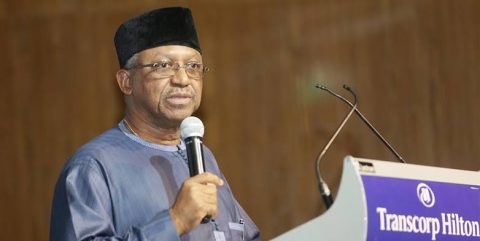Health Minister Defends $200m Loan To Buy Mosquito Nets
Featured, Latest Headlines, News Across Nigeria Tuesday, November 23rd, 2021
(AFRICAN EXAMINER) – The Minister of Health, Dr Osagie Ehanire says the 200 million dollars loan request is Nigeria’s counterpart fund to complement a global malaria action plan to combat malaria in the country.
Ehanire said this at the Bi-Weekly National Briefing on COVID-19, Cholera, Health Promotion and other related issues in Abuja.
African Examiner reports that the Senate Committee on Local and Foreign Loans kicked against a proposal by the FMOH to borrow 200million dollars under the Malaria Programme to buy mosquito nets in the 2022 budget.
The committee’s condemnation was in response to the Ministry of Health’s submission about its intention to borrow the amount for the purchase of mosquito nets for 13 vulnerable states.
Permanent Secretary in the ministry, Mahmuda Mamman had justified the proposal before the panel saying “the loan if approved by the National Assembly and accessed, will be used to medically fight malaria in the 13 orphan states which cover 208 local government councils and 3, 536 primary health care centres”.
Angered by his submission, Sen. Ibrahim Oloriegbe and other senators present descended heavily on the permanent secretary.
Oloriegbe wondered why N450 million was budgeted for malaria treatment in the proposed 2022 budget yet, plans were being made to borrow 200 million dollars for the same purpose.
“This is unacceptable. We should be able to put our feet down when dealing with these donor agencies or creditors as regards loans to be taken and what it should be expended on”.
While responding to question, the minister said that the amount in question was actually referred to a component of the World Bank assisted Multilateral Borrowing plan and it involved the African Development Bank and the Islamic bank.
“The project development was done by the Ministry of Health and Ministry of budget. The purpose is for Nigeria counterpart fund to complement a global malaria action plan.
“The main donors to this roll back malaria are three. The first is the U S. presidential malaria initiative which donated 295 million dollars and they are going to use that to cover 11 states.
“The global funds to fight AIDS, tuberculosis and malaria provides about 400 dollars for very high malaria burden in 13 states in the country to continue to roll back malaria, these are states which have no financial support for this programme.
“In order to have full coverage for our partners to release their funds, they need these 13 states to be covered on the condition that Nigeria will provide 200 million dollars for the 13 states for five years and this covers 208 LGAs, 3,536 PHCs and about millions of the population,” he explained.
Ehanire said that experts estimated that the money would avert 78,000 deaths, 14.5 million illnesses from malaria and provide 17. 6millon malaria services in these states.
“It is important to note that only 26 per cent of this is actually planned for net. The money is domicile in the ministry of finance and the ministry of health is only helping,” he added.
Meanwhile, the Director General of National Agency for Food and Drug Administration and Control(NAFDAC), Prof. Mojisola Adeyeye also disclosed that Nigeria was close to begin the manufacturing of vaccines to fight against disease outbreaks.
According to Adeyeye: “Nigeria is closer now to manufacturing its own vaccine and it will no longer be because it has no regulatory agency.
“Attaining the global benchmark will not have been possible without some in-country measures by the agency.
“The global bench has some eight functions. They are laboratory testing, market authorisation, market control, regulatory inspection and vigilance among others.
“We were asked to expand our laboratory . We have expanded the drug lab in Yaba and the vaccine lab is being built.
“The list the WHO gave us that we have 868 recommendations. This number came up through self- audit and that was in January 2018,” she explained.
Adeyeye said through self -audit, the Agency found out that the template that WHO gave to the country had 868 conditions to meet by October 15.
“We have met those recommendations. However, WHO have to come physically to work through our facilities and to pronounce that we have reached maturity level and that will be not too far from now.
“In terms of new standard regarding vaccine production, Yes science is not static, it is dynamic, medical science is not static, we produced yellow fever vaccine before in Nigeria.
“The rules have changed and the rule is that anybody that wants to produce malaria vaccine must have a strong regulatory body. That is why we had so many recommendations that we have been working on to meet,” she added.
NAN
Related Posts
Short URL: https://www.africanexaminer.com/?p=71059























